I’m really getting like Delisle’s travelogues. This one is substantially longer than 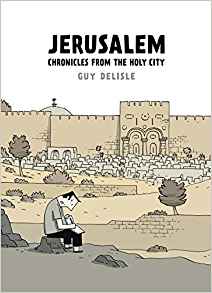 the others I’ve read, and is also particularly pretty. It documents the one year he spent in Jerusalem with his family while his wife worked for an NGO. There are a few small adventures, but as usual, what’s really enjoyable is you get a sense of Delisle’s personal experience of the place – not just its sights and people, but how at times he felt frustrated, bored, confused, and so forth. He does such a good job of capturing the feel of his experience by sharing small moments. Wonderful stuff.
the others I’ve read, and is also particularly pretty. It documents the one year he spent in Jerusalem with his family while his wife worked for an NGO. There are a few small adventures, but as usual, what’s really enjoyable is you get a sense of Delisle’s personal experience of the place – not just its sights and people, but how at times he felt frustrated, bored, confused, and so forth. He does such a good job of capturing the feel of his experience by sharing small moments. Wonderful stuff.
Category: Arts & Literature
The Arab of the Future 2
A fine continuation of the first book. The only negative note I have is that I want more!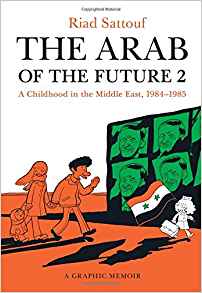
Shenzhen
These DeLisle books are just delightful. They’re light and fun, but you really get a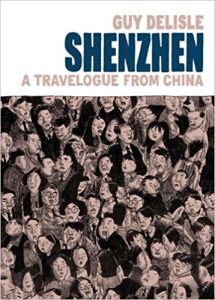 feel for his experiences going to work in other countries. This one was less funny than the North Korea one, but as a comic I think it was better. He does such a good job of capturing the feeling of loneliness and isolation he experienced. In part this is accomplished by developing a set of silent images for different people and places in the city. These images recur over the course of a book that is sometimes funny and sometimes sad, but either way serves very well to convey his experience as a guy who doesn’t speak Chinese going to work in a city with few English speakers. Highly recommended.
feel for his experiences going to work in other countries. This one was less funny than the North Korea one, but as a comic I think it was better. He does such a good job of capturing the feeling of loneliness and isolation he experienced. In part this is accomplished by developing a set of silent images for different people and places in the city. These images recur over the course of a book that is sometimes funny and sometimes sad, but either way serves very well to convey his experience as a guy who doesn’t speak Chinese going to work in a city with few English speakers. Highly recommended.
Vietnamerica
What a great memoir. I’ve been reading a lot of memoirs in graphic novel format lately, and this one was one of the very best, both in terms of its style and execution. I especially enjoyed the way in which the book moved from scene to scene without frequently telling you what year or location it was. The artwork 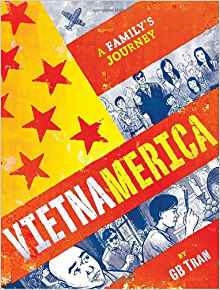 and, well, comicking itself was just so good that I rarely had to take a second to figure out where the scene had changed to.
and, well, comicking itself was just so good that I rarely had to take a second to figure out where the scene had changed to.
The only critique that occurred to me is that the “character” of Tran himself in the story feels very… unformed. Maybe this is simply because it depicts Tran mostly at a younger age, where he would’ve been, indeed, unformed. But, I couldn’t help but feel that the character is so self-flagellating (he is almost always depicted as a sort of know-it-all punk kid) that you miss what could be a more whole interaction between kids and parents. Tran’s past self feels less like a person than a point of embarrassment that the author is covering over with humor. It still works well enough, but I would’ve loved if, here and there, we had a moment of just Tran being himself, in a way that only develops character, rather than moving forward the book’s telling of history.
But, still, quite a good memoir comic, and absolutely beautiful.
Pyongyang
A quick and fun sketch of the author’s time spent working for an animation 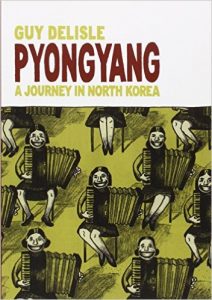 studio in North Korea. I don’t have too much to say about it, other than that it’s quite enjoyable, and that I plan to read other books by the author. This isn’t a memoir like March or Maus – it’s not trying to bring you to a heightened awareness of the universe. It’s not particularly poignant, nor is it trying to be. It’s just an incredible well-told, occasionally quite funny, recounting of a short strange time in the author’s life.
studio in North Korea. I don’t have too much to say about it, other than that it’s quite enjoyable, and that I plan to read other books by the author. This isn’t a memoir like March or Maus – it’s not trying to bring you to a heightened awareness of the universe. It’s not particularly poignant, nor is it trying to be. It’s just an incredible well-told, occasionally quite funny, recounting of a short strange time in the author’s life.
American Born Chinese
I really enjoyed this book, which is a sort of braiding of three plotlines, one a fable, one a farce, one a diary, all of them on the topic of finding one’s identity as an Asian person in a predominantly white society.
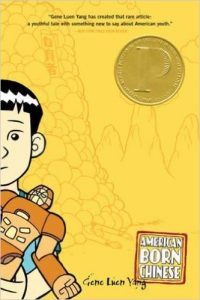
The only thing I will say by way of critique (and maybe this is sort of like someone at a restaurant critiquing small portions rather than quality, BUT…) is that the diary portions were so clever and subtle that I found myself rushing through the other segments. The other parts were there for a reason, and certainly were important to the building of the story and the ultimate coalescing of the different narrative melodies, but… I feel like I could have easily enjoyed three or four hundred pages of the more realistic portion of the tale.
The Wild Party
Wow. What an incredible poem and story. I wasn’t able to put it down after I read the first stanza.
This book was written in the 1920s, but didn’t get much of a print run, mostly due to the sex and murder, one suspects. Anyway, it is a great story told with incredible melody. Here’s a stanza, selected more or less at random:
The candles flared: their flames sprang high: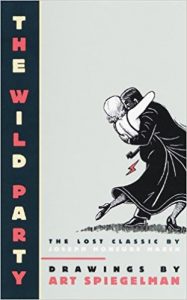
The shadows leaned dishevelled, awry;
And the party began to reek of sex.
White arms encircled swollen necks:
Blurred faces swam together: locked
Red hungry lips:
Closed eyes:
Rocked.
White shoulders burst their ribbon bands;
Rose bare to passionate, fumbling hands:
White slender throats curved back beneath
Attacking mouths that choked their breath.
In short: DANG. Wow, what a book. The version I got was a re-issue with very pretty artwork by Art Spiegelman, author of Maus. He apparently happened on the book by accident, due to finding it in a used book store, having a beautiful cover. The illustrations are an excellent reason to re-issue the book, but the star here is really the words. I won’t go so far as to the pictures take away from the poem – they, in fact, have this wonderful Art Deco gruesomeness that I assume was in part inspired by Ward’s book “Gods’ Man” – but part of me regrets having not read it first without pictures.
Everybody Behaves Badly: The True Story Behind Hemingway’s Masterpiece The Sun Also Rises
A delightful history of how the book The Sun Also Rises got written. It’s basically 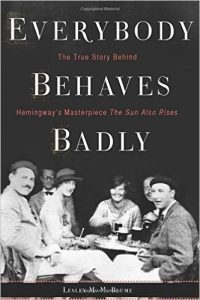 a slice of Hemingway’s early life, right up until that book made him famous (and a tiny bit afterward). My only gripe is it participates in this notion about Hemingway that I’m not quite ready to sign up for – that he was some sort of master of image creation. I’m sure he put forward an image of himself, but that’s true of every writer. It’s not obvious to me that he does it more than just about anyone else, and I don’t see him as especially calculating about it. I mean, he did put forward an image, but he also really actually liked drinking hard and watching bullfights.
a slice of Hemingway’s early life, right up until that book made him famous (and a tiny bit afterward). My only gripe is it participates in this notion about Hemingway that I’m not quite ready to sign up for – that he was some sort of master of image creation. I’m sure he put forward an image of himself, but that’s true of every writer. It’s not obvious to me that he does it more than just about anyone else, and I don’t see him as especially calculating about it. I mean, he did put forward an image, but he also really actually liked drinking hard and watching bullfights.
Still, it’s well-researched and tells a great story about a great story. If you’re interested in Hemingway, you’ll like it.
